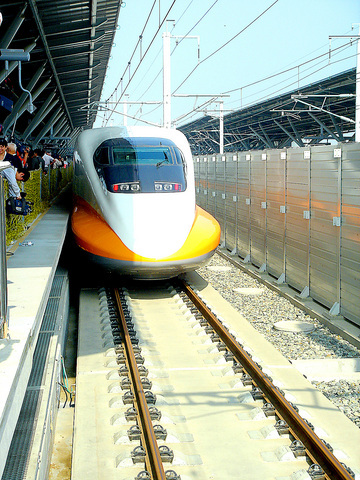After four months of delays, the Taiwan High Speed Rail Corp (THSRC) began its first test run of Taiwan's bullet train yesterday, hoping to begin regular service by the end of October, as orginally scheduled.
"Only months from now, people in Taiwan will see the trains flying along the west coast of Taiwan," said THRSC chairwoman Nita Ing (

PHOTO: JESSIE HO, TAIPEI TIMES
Over the next four to six weeks, THSRC will test the train on a 60km-track between Kaohsiung and Tainan, starting at the speed of 30kph, and then gradually gearing up to 120kph.
Kazuo Sato, chairman of the Taiwan Shinkansen Corp, who also attended the inauguration, said the train has passed tests running at 300kph in Japan, and that the company will help THSRC to resolve technical problems, allowing the train to roar along at the same speed on Taiwan's tracks.
The 700T train, based on the Japanese Shinkansen 700 Series, has been modified to accommodate Taiwan's environment, and has 12 carriages, including nine motor cars and three trailer cars that can carry a total of 989 passengers. THSRC has ordered 30 complete train sets, which will be delivered to Taiwan by the end of September.
THSRC has completed 78 percent of the 345km project, which connects the northern and southern parts of the country, but the progress seems to be slow, given the Oct. 31 deadline for completion that the company has set.
Ing was noncommittal as to whether the company can meet the deadline, saying: "As the leader of this project, I have to have confidence that it will be completed on time ... We can't predict the future, but we will try our best."
Formosa Plastics Group chairman Wang Yung-ching (
THSRC failed to meet its target of NT$7.5 billion (US$236.6 million) in investment by the end of last year, and is keen to find potential investors to resolve its burgeoning financial crisis.
According to Arthur Chiang (
Ing dismissed media reports that the Taiwan high-speed railway is a hybrid mix of Japanese and European systems with many safety concerns. Chiang explained that THSRC only uses larger turnouts -- a type of track structure necessary for switching to parallel rails -- made in Germany on four steep slopes, as required by the Taiwan High Speed Rail Bureau, while the rest of the parts and components are from the Japanese Shinkansen system.
The turnouts have passed tests in Germany, and thus pose no threat to passenger safety, Chiang said.

DAREDEVIL: Honnold said it had always been a dream of his to climb Taipei 101, while a Netflix producer said the skyscraper was ‘a real icon of this country’ US climber Alex Honnold yesterday took on Taiwan’s tallest building, becoming the first person to scale Taipei 101 without a rope, harness or safety net. Hundreds of spectators gathered at the base of the 101-story skyscraper to watch Honnold, 40, embark on his daredevil feat, which was also broadcast live on Netflix. Dressed in a red T-shirt and yellow custom-made climbing shoes, Honnold swiftly moved up the southeast face of the glass and steel building. At one point, he stepped onto a platform midway up to wave down at fans and onlookers who were taking photos. People watching from inside

A Vietnamese migrant worker yesterday won NT$12 million (US$379,627) on a Lunar New Year scratch card in Kaohsiung as part of Taiwan Lottery Co’s (台灣彩券) “NT$12 Million Grand Fortune” (1200萬大吉利) game. The man was the first top-prize winner of the new game launched on Jan. 6 to mark the Lunar New Year. Three Vietnamese migrant workers visited a Taiwan Lottery shop on Xinyue Street in Kaohsiung’s Gangshan District (崗山), a store representative said. The player bought multiple tickets and, after winning nothing, held the final lottery ticket in one hand and rubbed the store’s statue of the Maitreya Buddha’s belly with the other,

‘NATO-PLUS’: ‘Our strategic partners in the Indo-Pacific are facing increasing aggression by the Chinese Communist Party,’ US Representative Rob Wittman said The US House of Representatives on Monday released its version of the Consolidated Appropriations Act, which includes US$1.15 billion to support security cooperation with Taiwan. The omnibus act, covering US$1.2 trillion of spending, allocates US$1 billion for the Taiwan Security Cooperation Initiative, as well as US$150 million for the replacement of defense articles and reimbursement of defense services provided to Taiwan. The fund allocations were based on the US National Defense Authorization Act for fiscal 2026 that was passed by the US Congress last month and authorized up to US$1 billion to the US Defense Security Cooperation Agency in support of the

HIGH-TECH DEAL: Chipmakers that expand in the US would be able to import up to 2.5 times their new capacity with no extra tariffs during an approved construction period Taiwan aims to build a “democratic” high-tech supply chain with the US and form a strategic artificial intelligence (AI) partnership under the new tariffs deal it sealed with Washington last week, Taipei’s top negotiator in the talks said yesterday. US President Donald Trump has pushed Taiwan, a major producer of semiconductors which runs a large trade surplus with the US, to invest more in the US, specifically in chips that power AI. Under the terms of the long-negotiated deal, chipmakers such as Taiwan Semiconductor Manufacturing Co (TSMC, 台積電) that expand US production would incur a lower tariff on semiconductors or related manufacturing